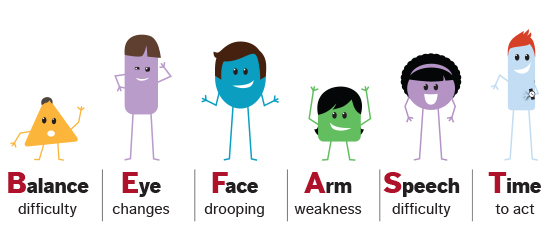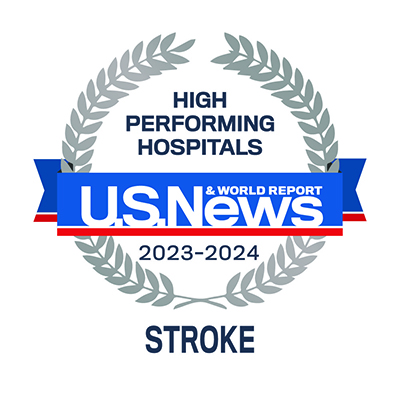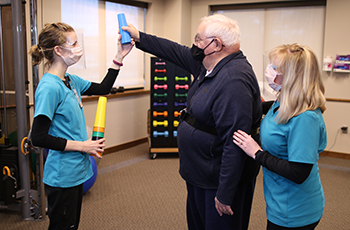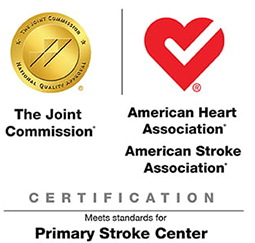Stroke
Someone has a stroke every 40 seconds in the United States. And stroke is the national leading cause of serious long-term disability. That’s why our certified Stroke Center at North Kansas City Hospital (NKCH) is devoted to stroke education, early treatment and stroke rehabilitation in the Northland. We’re here for you and your family — so you get the stroke care you deserve.
Signs of a Stroke

A stroke is a neurological condition that happens when blood supply to the brain is blocked. It’s important to know when someone is having a stroke, so they can get treatment right away. An easy way to remember common signs of a stroke is BE FAST:
-
- Balance: Sudden dizziness or loss of balance or coordination
- Eye: Trouble seeing out of one or both eyes
- Face: Facial weakness or numbness, or an uneven smile
- Arm: Unable to raise both arms evenly
- Speech: Slurred speech or difficulty repeating simple phrases
- Time: If you notice the signs, it’s time to act
Call 911 if you think someone is having a stroke, even if symptoms go away quickly. It’s possible to have a mini-stroke (called a transient ischemic attack, or TIA) as a warning. Getting treatment can prevent a full stroke.
Stroke Risk Factors
Not all strokes are preventable. But there are some lifestyles changes that may help lower your risk for stroke. Factors that increase your stroke risk include:
- Age
- Anxiety, depression and stress
- Brain aneurysms
- Eating unhealthy foods
- Ethnicity
- Excessive drinking
- Family history and genetics
- Heart and blood vessel diseases
- High blood pressure
- High cholesterol
- Inflammatory infections or conditions
- Lack of regular exercise
- Long-term birth control use
- Long-term exposure to environmental pollution
- Obesity
- Smoking
Stroke Treatment & Rehabilitation
 Successful stroke treatment starts with timely care. First, your neurologist will see what type of stroke you have:
Successful stroke treatment starts with timely care. First, your neurologist will see what type of stroke you have:
- Ischemic (caused by a blockage in an artery that supplies blood to the brain)
- Hemorrhagic (caused by blood from an artery bleeding into the brain)
From there, they’ll develop a treatment plan that meets your needs.
Telestroke
When you’re having a stroke, you need treatment — fast. Our telestroke specialists at NKCH are available 24/7. When you arrive in the Emergency Room or show signs of a stroke while in the hospital, our doctors are able to connect with a neurologist right away by video. They’ll look at your situation, view CT scans and refer you to the appropriate care.
Stroke Rehabilitation

After you have a stroke, neurologic rehabilitation helps you get the most out of recovery. You’ll usually start our stroke rehabilitation program while you’re still in the hospital. You may continue it after you go home with outpatient therapy.
Stroke rehabilitation may mean relearning certain skills, such as bathing, eating, dressing or walking. You’ll work with your stroke rehab team to regain as much independence as possible. Your team will include:
- Physical therapists, who work with you to regain mobility.
- Occupational therapists, who focus on improving your daily activities such as getting dressed.
- Speech-language therapists, who help with swallowing difficulties, eating and voice strength, as well as language, attention, memory and problem solving.
Excellence in Stroke Care

When you come to NKCH for stroke care, you can expect the best. We are a Joint Commission-certified Primary Stroke Center. That means we meet high standards set by The Joint Commission, American Heart Association and American Stroke Association for caring for patients with stroke. It also reflects our long-term success in improving patient outcomes.
Learn about our other neurology services.
Patient Stroke Stories
Recovering from a stroke can be hard work. But it’s helpful knowing that you’re not alone. Hear from other patients who received stroke care at NKCH.
For more support, consider attending our Stroke Support Group through the Acute Rehab Unit. It’s available to stroke survivors, caregivers and loved ones.
Success Spotlight
With undeniable drive, Bill Johnson embraced his stroke rehab treatment to overcome his challenges and return to living independently.
Like many people, Steve didn’t recognize he was having a stroke. His transition to rehab wasn’t easy, but by the time he left, he made great strides toward recovery.